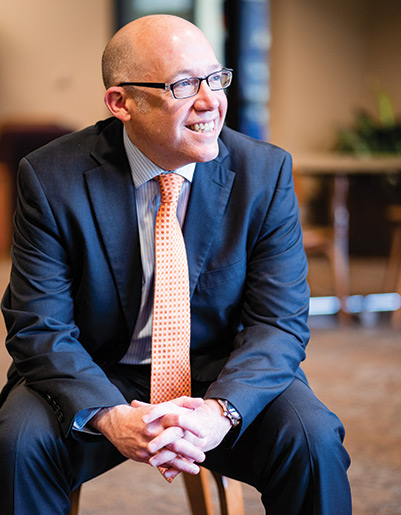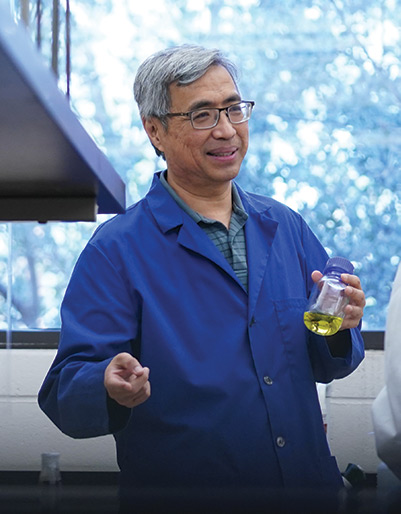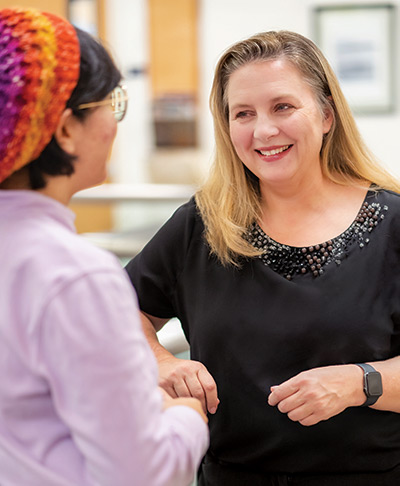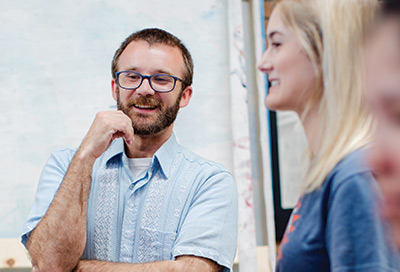 DALE SCULLY MENTORS STUDENTS TO SUCCEED BY TALKING ABOUT A TIME HE FAILED.
DALE SCULLY MENTORS STUDENTS TO SUCCEED BY TALKING ABOUT A TIME HE FAILED.
As a freshman at a community college, he flunked one class, did poorly in others and landed on academic probation. Scully (pictured previous page) soon dropped out to work and coach. Six years later, he earned a master’s degree from the Ivy League’s Columbia University and today is vice president of campus life at Fresno Pacific University.
“Sharing that failure—and how I came back from it—helps students understand that we’re all in process, and that successes and failures go hand in hand,” Scully says. “We’re all people who are growing and developing.” Communicating that reality requires vulnerability, but it builds relationships with students and enables them to share honestly and receive a mentor’s counsel. “If you’re trying to keep a wall between yourself and students, they will have a harder time reaching out to you and connecting,” he says.
A MISSION TO MENTOR
Fresno Pacific freshmen, seminary students, athletes and others experience mentoring to meet many needs. Academic. Spiritual. Emotional. As a Christian university, FPU seeks not only to educate but also equip students for a life of learning and service. Mentoring advances that calling. For freshmen and transfer students, it begins in a seminar class in their first semester. Groups of 10 to 15 students meet weekly with a faculty advisor and two peer mentors to discuss topics ranging from careers to making friends on campus. Individual meetings also occur.
“Having someone come into your office to discuss why they’re in college, and where they hope to go, can lead in many different directions,” Scully says. While teaching the seminar, he had a student open up about his ongoing substance abuse. Scully and the student talked about campus counseling options and accountability. “There’s not a college in the U.S. that doesn’t have these types of stories,” he says. “Students struggle, and they need the connections that come through mentoring to find the resources to work through their problems.”
C.J. Haydock (BA ’09), head men’s basketball coach, believes mentoring is a vital part of the university’s mission. “It is so integral to the Fresno Pacific Idea—that we are a Christian university, a community of learners and prophetic—and it’s what we do best,” he says. About half of Haydock’s players are African American. In 2020, they needed to process complex emotions following the murder of George Floyd. Haydock already had in place weekly one-on-one sessions (in person or on Zoom)—in which he and players talk about life, not basketball. Haydock’s questions can include: When did you last talk to your mom? How’s your girlfriend? What about that internship next summer to help with your career?
“I ask leading questions, and I’m getting to hear their dreams, their successes and their struggles,” Haydock says. “And then occasionally I offer my input. You want to listen twice as much as you guide.” Haydock did his best to mentor his players in 2020 but recognizes his limitations. “I’m a 35-year-old white male who’s had every possible privilege. To fully understand my players and their struggles, I have to do the rigorous intellectual study of race in this country and the societal structures we’ve built. Even then, I only get a sliver of their reality,” he says.
 IDENTIFYING WITH MENTORS
IDENTIFYING WITH MENTORS
The School of Natural Sciences offers opportunities to students in biology, chemistry, health, kinesiology and mathematics to conduct research with faculty members. Mentoring relationships develop in the process. “The research can be clarifying for a student’s career, and the faculty mentor becomes part of a student’s professional network,” says Karen Cianci, Ph.D., who retired as dean of the school last summer.
Ken Cheung, Ph.D., associate professor of chemistry and chemistry program director, says the research/mentoring model boosts the academic success and career possibilities for groups traditionally underrepresented in STEM disciplines (science, technology, engineering and mathematics): women, Hispanics, African Americans, first-generation college students and low-income students receiving federal aid.
 Tara Sirvent, Ph.D., new natural sciences dean, says mentoring also helps first-generation college students see faculty members as “real people,” making it easier to seek help and guidance. Furthermore, a diverse cadre of mentors— including women, African Americans and Hispanics—benefits similar students. “Mentoring is not only about finding resources and establishing networks, but seeing images of yourself in what you want to be,” Sirvent says.
Tara Sirvent, Ph.D., new natural sciences dean, says mentoring also helps first-generation college students see faculty members as “real people,” making it easier to seek help and guidance. Furthermore, a diverse cadre of mentors— including women, African Americans and Hispanics—benefits similar students. “Mentoring is not only about finding resources and establishing networks, but seeing images of yourself in what you want to be,” Sirvent says.
‘SAFE SPACE’
At Fresno Pacific Biblical Seminary, mentors and students in one online program live throughout the United States and Canada. The mentors (referred to as coaches) provide a listening ear and guidance to students seeking an M.A. in Ministry, Leadership and Culture. Most students already work in churches or nonprofits and, significantly, don’t live in the same communities as their coaches. This gives students “a safe space to share the good, the bad, and the ugly” of their ministry positions as they apply what they’re learning to daily realities, says Brian Ross, D. Min., associate professor of pastoral ministries and director of the program.
Eldon Fry, who lives near Harrisburg, PA, has decades of pastoral experience and has served as a coach for six years. “It can be reassuring for somebody at my point in life to say to a student, ‘I care about what you’re saying. You can make it,’” he says.
Students in bachelor’s degree completion programs often need that kind of encouragement as they juggle work, family and course work. Academic advisors in Bakersfield, Merced, North Fresno and Visalia can step in to help. “They’re not just saying ‘Take this class. Drop this class.’ The advisors are helping our adult learners navigate real-life situations and figure out how to get across the finish line to graduation,” says Denise Baronian (MA ’13), executive director of regional enrollment. “Many times they’ll pray with students. It’s very personal and hands-on.”
The pandemic made such care especially important, says Dani Fox-Lopez, M.S., assistant director for advising at the Bakersfield Campus. As COVID-19 spread, some students lost family members, got sick themselves or lost jobs. “Our students needed someone who knew what they were going through to listen and help give them reasons to keep going,” she says.
 LIFE LESSONS
LIFE LESSONS
Mentoring is an inevitable part of instruction
at FPU, says Chris Janzen, M.F.A, assistant professor of art. Smaller classes allow students and faculty to develop relationships that begin around course material and extend to deeper issues. In his art classes, for example, he learns about family histories, career goals and even what music students like as they sculpt, paint or draw. “Sometimes students haven’t quite figured out how to organize all the different pieces of their lives,” he says. “But I can give advice that is very tailored to each individual because I know them so well.”
Janzen is not only helping students graduate but preparing them for the years ahead. “Everyone has to juggle many tasks in their work and family lives, and sometimes that’s what mentoring is—dealing with broad life lessons.” In the final analysis, he adds: “There’s a sense of family at FPU. We’re in this thing together.”

